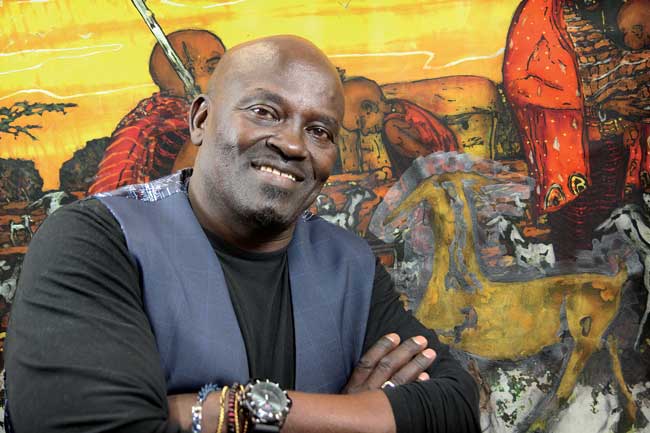In the African country of Kenya, the population size is roughly 50 million people with 42 distinct tribes. Each tribe boasts its own history, culture, and traditions. Nicholas Sironka hails from the Maasai people and is the only person on the planet who shares Maasai culture through his batik paintings.
Sironka was born in the southern grasslands of Kenya and grew up in a town named Kiserian, which means “a place of peace.” In Nairobi, Sironka pursued his life-long love of art and learned batik, a unique fabric-dyeing technique which hails from Indonesia. Each of his paintings depicts facets of Maasai culture, showcasing village life in all of its richness and simplicity.
“Growing up, I would travel to my ancestral village and observe life around me. My paintings are intended to share a piece of our culture with whoever sees them, and to spark conversation around universal messages that foster connection and gratitude,” Sironka shares.
Sironka enjoys the unique challenge that batik brings, “You work with hot wax and cold water fabric dye to create your designs. The more you do it, the better you become. I feel more motivated to try new things each time I complete a piece.”
Throughout his career, Sironka has enjoyed giving to others and using art as a vehicle for healing. In the mid-1990s, he was invited by the United Nations High Commission of Refugees to work with children in refugee camps near the Sudanese border. These children had experienced tremendous trauma, and Sironka helped them process their experiences through painting. “I had no idea the impact I would leave on these children. Seventeen years later when I was at Shoreline Community College, these Sudanese boys came up to me and hugged me. They had remembered me from when I came to teach them to paint at the refugee camp. I couldn’t believe it!” Sironka says with wide eyes.
In the spirit of providing opportunities for their people, Sironka and his late wife Seleina formed the Friends of Sironka Dance Troupe, the first ever Maasai performance group. It was comprised of villagers who lacked the opportunity to attend school, but were gifted singers and performers. They began performing in the U.S. to share their culture and raise money for their families back home.
Sironka shares that while performing in the UK in 2007, they were honored to meet Prince (now King) Charles III and his wife, Camilla! “Our travel funds came from selling tickets for each performance, and the dancers sold hand-made beaded jewelry. Each dancer would return home with $6,000-9,000 to build better houses, support their families, and improve their lives,” Sironka recounts.
Sironka has always been passionate about improving the lives of others. “My life philosophy is this: if I can use my talent to make someone else’s life better, then that’s why I was put on this planet. To be rich is to enrich other people’s lives. Money is not happiness, life is happiness. And it’s about finding happiness in each moment.”
Walking the walk, Sironka also started a campaign called “Plant a Tree, Change a Life” to help young, unwed Kenyan mothers complete their high school education. “If a young woman becomes pregnant, she is often expected to leave school and get married to care for her child. I partnered with U.S. sponsors to cover the cost of their high school education and provide a stipend to the grandmothers to help care for the babies while their daughters were at school. During each school break, the students plant a tree in honor of their sponsors back in the U.S.. When these women finish high school at age 20, they are free to choose their own lives. She can get married or not, pursue higher education, or whatever she decides. We’ve helped 62 young women complete their education, some of whom went on to become doctors and policewomen.”
Sironka first visited Spokane in 1999 to attend the wedding of a former student. He returned on a Fullbright scholarship to teach classes on batik and Maasai culture at Whitworth University. “Spokane became the place I would keep returning to whenever I was in the U.S.. After doing art therapy with children who were cancer patients at Sacred Heart, I decided to become a counselor. The only counseling program available was addiction counseling, and I said, ‘I’ll take it!’” Sironka laughs.
Sadly, Sironka’s wife, Seleina, died suddenly in 2013. After spending time with his family in Kenya to mourn, he returned to the U.S. to continue his path of counseling. “It was hard for me to stay in Kenya after she died. I really struggled with my grief, but had a good therapist, support from church, and was able to heal through my art and the power of gospel music, which my wife loved to sing,” Sironka shares.
He now works as an addiction counselor for inmates and offers batik classes out of his studio at M.A.D. Co Lab Studios. Sironka is eager to share his art, culture, and uplifting messages with others: “In the past, I’ve spoken at the Smithsonian Institution and the Kennedy Center. My dream is to become a rotating cultural ambassador and share my art and culture with museums, universities, and schools around the world. In my culture, words are nourishment for the soul. I want to converse with others about universal topics and provide nourishment. I want to be contagious in doing good.”
As a humanitarian with many talents, Sironka has several projects he is working on which are aimed at improving the lives of others here in Washington and in Kenya. If you’re interested in having Sironka speak, want to take a Batik class with him, or are eager to learn how you can get involved in his many humanitarian projects, please email him at [email protected] and connect with him at www.facebook.com/batikartbysironka.



